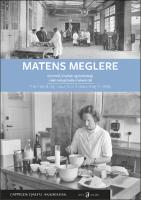Matens meglere
Kontroll, kvalitet og kunnskap i den industrielle matens tid
Contributor(s)
Finstad, Terje (editor)
Kvaal, Stig (editor)
Stokland, Håkon B. (editor)
Østby, Per (editor)
Language
NorwegianAbstract
How can we be sure that the food we buy in grocery stores won’t make us sick? The institutions, laws and regulatory systems put in place to safeguard that food is safe to consume are the result of a long and complex process. This book takes a close look at that process and at how various actors and institutions – we call them ‘food’s facilitators’ – have worked to ensure that the food we eat is fresh, healthy and safe.
Food’s Facilitators explores how modern foods and systems for food can be seen as the result of a series of administrative efforts and negotiations over how such food is produced. The authors examine laws and regulations, expertise, technologies, and media that contribute to binding the various modern industrialized food systems together. Their subject matter ranges from cookbooks and schools for housewives that have greatly influenced the Norwegian diet, to the industrial production of foods, freezer technology, date marking, and quality assessment. In addition, the authors look at the presentation of food on television as informational activity as well as debates about industrially produced ingredients and food products like margarine, artificial vanilla and farmed salmon.
Through these examples the book illustrates how regulation, quality and information became necessary cornerstones in the evolution of the food industry. The authors have backgrounds in science and technology studies, history, anthropology, sociology and media science.
The anthology has been edited by Terje Finstad, Stig Kvaal and Per Østby, all from the Department of Interdisciplinary Studies of Culture at the Norwegian University of Science and Technology (NTNU), and Håkon B. Stokland from the Norwegian Institute for Nature Research and NTNU’s Department of Interdisciplinary Studies of Culture. Hvordan kan vi stole på at maten vi kjøper i butikken ikke gjør oss syke? Etableringen av institusjoner, lover og kontrollsystemer som sikrer oss at maten er trygg, er resultatet av en lang og sammensatt historisk prosess. Denne boken ser nærmere på denne prosessen, og på hvordan ulike aktører og institusjoner – kalt matens meglere – har arbeidet for å gjøre maten vi spiser god, sunn og sikker.
Matens meglere viser hvordan moderne mat og matsystemer kan forstås som resultat av en rekke styringsforsøk og forhandlinger om hvordan mat blir til. Forfatterne ser på lover og regler, ekspertise, teknologier og medier som bidrar til å knytte de moderne industrialiserte matsystemene sammen. Tematikken strekker seg fra kokebøker og husmorskoler, som har hatt stor innflytelse på det norske kostholdet, til etablering av matvareindustri, fryseteknologi, datomerking og vurdering av matkvalitet. Videre ser forfatterne på mat på TV som opplysningsvirksomhet, og debatt omkring industrielt produserte ingredienser og matprodukter som margarin, vanilje og oppdrettslaks.
Gjennom disse eksemplene viser boken hvordan kontroll, kvalitet og kunnskap ble nødvendige omdreiningspunkt i den industrielle matens tid. Forfatterne har bakgrunn fra vitenskap- og teknologistudier, historie, antropologi, sosiologi og medievitenskap.
Redaktører er Terje Finstad, Stig Kvaal og Per Østby, alle ved Institutt for tverrfaglige kulturstudier ved NTNU og Håkon B. Stokland ved Norsk institutt for naturforskning og Institutt for tverrfaglige kulturstudier ved NTNU.
Keywords
Industrial food systems, food safety, regulation, quality, knowledge, science and technology studies, food history, Industrielle matsystemer, mattrygghet, kontroll, kvalitet, kunnskap, teknologi- og vitenskapsstudier, mathistorieDOI
10.23865/noasp.155ISBN
9788202756062, 9788202756031, 9788202756048, 9788202756055, 9788202652333Publisher website
https://www.cappelendamm.no/Publication date and place
Oslo, 2022Classification
Manufacturing industries
Food and beverage technology


 Download
Download Web Shop
Web Shop